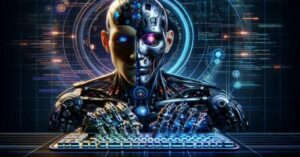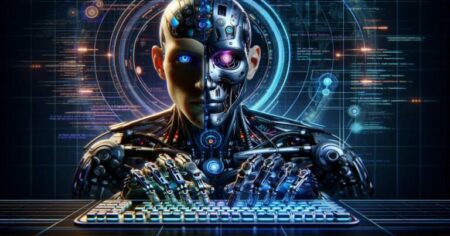As we move into 2025, artificial intelligence (AI) and machine learning (ML) continue to push boundaries across various industries. These technologies have already begun transforming businesses, improving efficiencies, and creating new opportunities. In 2025, AI and ML will reach new heights, reshaping entire sectors and offering solutions to complex problems. This article explores the five key sectors that will be revolutionized by AI and ML in 2025.
1. Healthcare: AI-Driven Diagnosis and Personalized Medicine
AI in Medical Diagnostics: Faster and More Accurate
The healthcare industry is undergoing a massive transformation thanks to AI and machine learning. In 2025, AI will significantly improve the accuracy and speed of medical diagnoses, especially in fields like radiology, pathology, and genomics. AI algorithms will assist doctors in identifying conditions such as cancer, heart disease, and neurological disorders at earlier stages, potentially saving millions of lives.
Benefits of AI in Healthcare:
- Early Detection: AI-powered diagnostic tools can analyze medical imaging and genetic data to identify diseases before symptoms appear, leading to earlier treatments and better outcomes.
- Personalized Treatment: Machine learning models will enable personalized treatment plans based on individual genetic profiles, lifestyle factors, and medical history.
- Enhanced Efficiency: AI will automate administrative tasks, freeing up healthcare professionals to focus more on patient care and improving overall efficiency.
In 2025, AI and ML are expected to become standard tools in medical practices, enhancing precision, reducing human error, and ultimately saving lives.
Robotic Surgery: Precision and Speed
Another area where AI will revolutionize healthcare is robotic surgery. With the help of machine learning, robotic systems will allow for minimally invasive surgeries with enhanced precision. These systems will be capable of performing highly complex procedures, reducing recovery times, and improving patient outcomes.
2. Finance: Automated Trading and Risk Management
AI in Financial Markets: Smarter Trading Decisions
In 2025, AI and machine learning will take center stage in the financial sector, particularly in trading and investment strategies. AI algorithms will analyze vast amounts of data in real time, making predictions and decisions much faster than human traders ever could. This will allow hedge funds, banks, and investment firms to optimize their portfolios, minimize risk, and maximize returns.
Benefits of AI in Finance:
- Real-Time Analytics: AI will analyze market trends and historical data, providing real-time insights to inform trading strategies.
- Risk Management: Machine learning models will assess market conditions and predict potential risks, enabling companies to make informed decisions about investments.
- Algorithmic Trading: AI-driven trading systems will become more sophisticated, enabling faster, more efficient execution of trades and greater market efficiency.
AI and machine learning will fundamentally change how financial markets operate, making them more dynamic, efficient, and accessible to a broader range of investors by 2025.
Fraud Detection: AI-Powered Security Systems
In addition to trading, fraud detection is another critical area where AI will make a significant impact. By 2025, machine learning models will be able to detect fraudulent activity in real-time by analyzing patterns of behavior across vast datasets. This will help financial institutions prevent fraud before it occurs, protecting both companies and consumers.
3. Retail: AI-Powered Personalization and Supply Chain Optimization
Personalized Shopping Experience: The AI Revolution
The retail sector is one of the most customer-centric industries, and AI will make shopping experiences even more personalized in 2025. By analyzing past purchases, browsing behavior, and social media activity, machine learning algorithms will offer highly personalized product recommendations. These systems will also predict future trends and customer preferences, helping retailers to stock the right products and optimize sales strategies.
AI-Powered Personalization in Retail:
- Product Recommendations: AI will deliver tailored recommendations based on consumer behavior and preferences, enhancing the shopping experience and driving sales.
- Dynamic Pricing: Retailers will use AI to set prices dynamically, adjusting based on demand, inventory levels, and competitor pricing.
- Customer Service: Chatbots and virtual assistants powered by AI will provide customers with quick, accurate responses, improving overall customer service.
Retailers that adopt AI will see increased customer loyalty, higher sales, and improved customer experiences in 2025.
AI in Supply Chain Optimization
AI will also play a crucial role in optimizing supply chains by predicting demand, improving inventory management, and reducing operational inefficiencies. In 2025, machine learning algorithms will analyze data from suppliers, customers, and competitors to forecast trends and optimize delivery routes, ultimately reducing costs and improving the speed of delivery.
4. Transportation: Autonomous Vehicles and Smart Infrastructure
AI-Powered Autonomous Vehicles
The transportation sector is on the verge of a massive shift, with AI and machine learning driving the development of autonomous vehicles. By 2025, we expect to see fully autonomous cars, trucks, and public transportation systems powered by AI, offering safer, more efficient, and more convenient travel options.
How AI Will Revolutionize Transportation:
- Self-Driving Cars: AI will enable fully autonomous vehicles to navigate roads safely, reducing accidents caused by human error and optimizing traffic flow.
- Autonomous Trucks: AI-driven trucks will revolutionize freight transportation by reducing costs, improving delivery times, and increasing safety.
- Smart Infrastructure: AI will be used to develop smart roads, traffic signals, and other infrastructure that communicates with vehicles, improving traffic management and reducing congestion.
By 2025, autonomous vehicles powered by AI will be a significant part of the transportation landscape, fundamentally changing how goods and people are transported.
AI in Public Transportation
AI will also improve public transportation by optimizing routes, reducing wait times, and improving scheduling systems. In 2025, AI-powered systems will enable more efficient and reliable public transport, making it a more attractive option for urban commuters.
5. Education: Personalized Learning and AI-Tutor Assistance
AI in Personalized Education
Education is another sector set to be transformed by AI in 2025. Machine learning and AI-powered tutoring systems will enable a more personalized learning experience for students. These technologies will assess individual learning styles and provide tailored lessons, helping students to learn at their own pace.
Benefits of AI in Education:
- Personalized Learning: AI will adapt to each student’s needs, providing customized assignments, feedback, and lessons to ensure optimal learning outcomes.
- AI Tutors: Virtual AI tutors will assist students with homework, answering questions and explaining difficult concepts in real-time.
- Automation in Administrative Tasks: AI will streamline administrative tasks such as grading, scheduling, and student progress tracking, allowing educators to focus more on teaching.
By 2025, AI will have a transformative impact on the educational experience, making learning more efficient, accessible, and personalized.
Conclusion
The power of AI and machine learning will continue to shape and transform industries in 2025. From revolutionizing healthcare and finance to transforming retail, transportation, and education, these technologies will drive unprecedented change. As businesses and governments invest more heavily in AI and machine learning, these sectors will become more efficient, accessible, and innovative.
In 2025, AI will no longer be a futuristic concept but an integral part of everyday life. Whether through smarter healthcare diagnoses, personalized retail experiences, or autonomous transportation systems, AI and ML will be at the forefront of the next industrial revolution.







